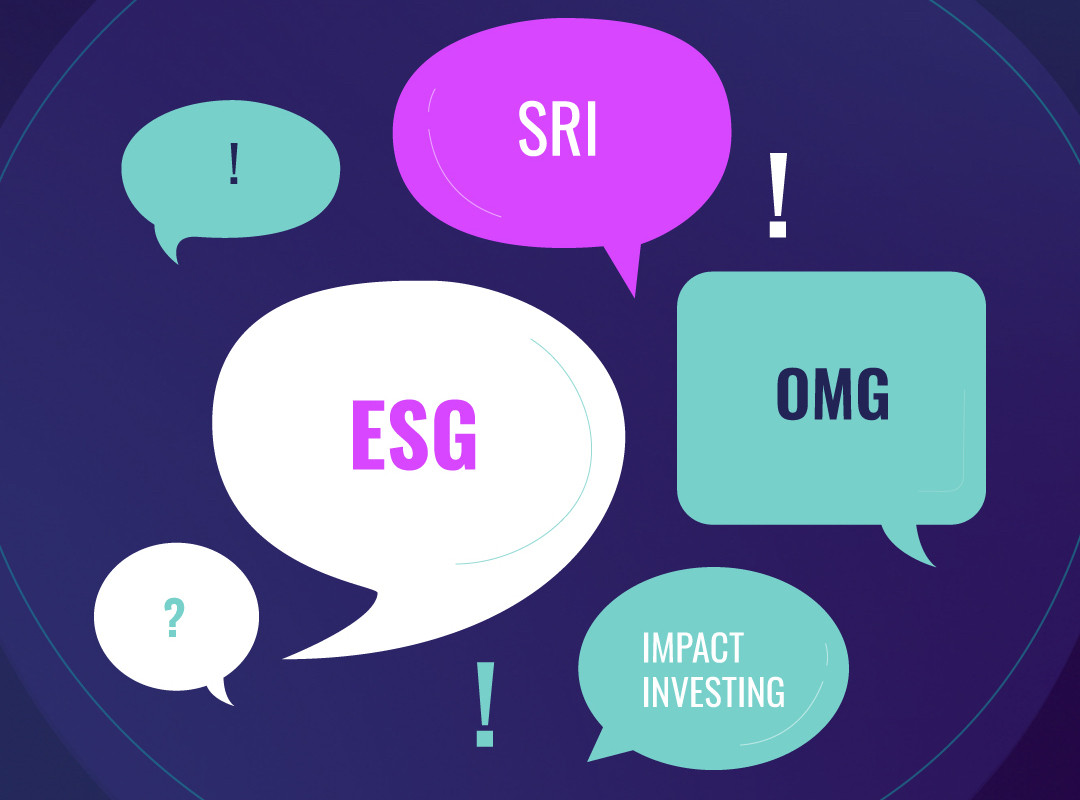 Back to Learn page
Back to Learn page

ESG Index: What Is It and What Are Some Examples?
When investors want to understand the way a market is performing, they often look at a market index. An index is a tool that is used to measure the performance of a certain group of assets, typically by taking the weighted average of those assets in order to create a representative sample.
There are many different types of indices. One that has been in the news a lot recently is the Consumer Price Index, which measures the average price change over time for a select group of consumer goods and services. People have been paying attention to this index because it provides a useful way to measure inflation in the US, especially in terms of how it’s felt by your average consumer.
Some other indices you may have heard of are the S&P 500 and Dow Jones Industrial Average, which both measure stock market performance by looking at either a group of 500 American publicly traded companies (S&P 500) or a basket of 30 industrial stocks (DJIA).
Indices are popular tools to help track markets, regardless of whether those markets are broad or more niche. So it should come as no surprise that some investors use ESG indices in order to follow the performance of companies that prioritize their environmental, social, and governance practices.
What is an ESG index?
An ESG index is a collection of stocks of companies that exhibit high ESG performance. Like other indices, an ESG index is designed to act as a market benchmark, specifically for companies that prioritize ESG within their business operations.
These ESG indices can help investors track high-performing ESG companies, compare those companies to the broader market, or provide an investment opportunity through an affiliated ETF or mutual fund.
ESG indices are often put together by a company that provides its own ESG rating system, or by a financial institution that tracks the market. Each ESG index has its own method of picking stocks to be included, rebalancing over time, weighing underlying assets, and taking averages. So each ESG index provides a unique benchmark.
Here are some examples of different ESG indices, as well as what makes them unique.
(This list is intended for educational purposes only, and should not be seen as an endorsement to invest. Employing ESG strategies may not result in favorable investment performance.)
S&P 500 ESG Index
S&P Global’s S&P 500 index provides a market cap-weighted index of 500 large publicly traded companies. As mentioned before, it’s a popular index for investors who want a snapshot of the US stock market.
But to turn the S&P 500 into an ESG index, S&P Global analyzed its list of 500 companies to find the top ESG performers and filter out the companies involved in controversial weapons, tobacco, coal production, or companies that had disqualifying UN Global Compact scores. As of 2022, around 300 of the original 500 companies are included in the S&P 500 ESG index.
This makes the S&P 500 ESG index a more exclusive list than its parent index. And since the S&P 500 ESG index has significant overlap with the S&P 500, some investors like to compare the two indices to see if companies that prioritize ESG actually outperform their counterparts.
S&P SmallCap 600 ESG Index
Similar to how S&P Global took its S&P 500 benchmark and refined it using an ESG lens, the organization did the same thing for its index tracking small cap companies.
While the S&P 500 tracks 500 public companies with large market capitalizations, the S&P SmallCap 600 index tracks companies with a market capitalization between $850 million and $3.7 billion. So the S&P SmallCap 600 ESG index uses S&P Global’s same methodology to pick out the top ESG performers from the SmallCap index and exclude companies involved in controversial practices.
S&P Global actually has a number of different ESG indices that it creates by refining one of its parent indices, or by compiling different ESG indices to create a composite index. These indices are meant to provide benchmarking for companies based on their market cap, geography, and more (as well as their ESG performance).
Refinitiv/S-Network ESG Best Practices Indices
ESG data provider Refinitiv has developed a handful of ESG indices that fall under its Refinitiv/S-Network ESG Best Practices Indices umbrella. This includes the Refinitiv/S-Network US Large-Cap ESG Best Practices Index, Refinitiv/S-Network US Large-Cap Environmental Best Practices Index, Refinitiv/S-Network US Large-Cap Social Best Practices Index, Refinitiv/S-Network US Large-Cap Governance Best Practices Index, Refinitiv/S-Network Emerging markets ESG Best Practices Index, and a handful of others.
These indices take the ESG rating system developed by Refinitiv and S-Network in order to provide a benchmark that tracks the top ESG performers. Altogether, these indices represent over 11,000 companies, which have been analyzed across more than 630 ESG performance indicators.
The Refinitiv Global Resource Protection Select Index
While the Refinitiv/S-Network ESG Best Practices Indices look at ESG performance across more than 630 indicators, the Refinitiv Global Resource Protection Select Index narrows its scope by focusing on companies that perform well under Refinitiv’s “Resource Use” category.
This means that companies included in the index have displayed efforts to reduce their materials, energy, or water usage, as well as made an effort to implement more sustainable efforts in their supply chain management.
MSCI USA ESG Select Index
Morgan Stanley Capital International put together its MSCI USA ESG Select Index by compiling companies with positive environmental, social, and governance factors that display similar risk and returns metrics to its more broad MSCI USA Index. The index is designed to maximize exposure to ESG factors by providing more weight to companies with high ESG ratings, and less to companies with low ESG ratings.
MSCI KLD 400 Social Index
An honorable mention goes to the MSCI KLD 400 Social Index, which evolved from the Domini 400 Social Index — one of the oldest ESG indices that still exists.
The Domini 400 Social Index was created in 1990, over a decade before the term “ESG” was coined. This index was designed to track companies suitable for the “socially-responsible investing” movement, and has since evolved to incorporate the more standardized criteria that ESG provides.
Morningstar Global Markets Sustainability Index
Financial services company Morningstar has a handful of ESG indices. Among them is its Morningstar Global Markets Sustainability Index, which is designed to reduce the risk caused by issues related to poor performance in environmental, social, and governance factors. Companies included in the list are from the Morningstar Global Markets Large-Mid Index.
Nasdaq-100 ESG Index
The Nasdaq-100 ESG Index is an ESG screened version of the Nasdaq-100, which is a basket of 100 of the largest companies traded on the Nasdaq stock exchange. In order to turn the Nasdaq-100 Index into the Nasdaq-100 ESG Index, the financial organization says it looks at 15 potentially problematic areas of business and excludes them from the ESG index.
But Nasdaq also admits that most of the companies in the Nasdaq-100 parent index take ESG seriously. So only 6% of companies in the original index get filtered out to create the Nasdaq-100 ESG Index.
∙ ∙ ∙
The views expressed are those of the author at the time of writing, are not necessarily those of the firm as a whole and may be subject to change. The information contained in this advertisement is for informational purposes and should not be regarded as an offer to sell or a solicitation of an offer to buy any. It does not constitute a recommendation or consider the particular investment objectives, financial conditions, or needs of specific investors. Investing involves risk, including the loss of principal. Past performance is not indicative or a guarantee of future performance. We do not provide tax, accounting, or legal advice to our clients, and all investors are advised to consult with their tax, accounting, or legal advisers regarding any potential investment. The information and any opinions contained in this advertisement have been obtained from sources that we consider reliable, but we do not represent such information and opinions are accurate or complete, and thus should not be relied upon as such. This is particularly true during periods of rapidly changing market conditions. Employing ESG strategies may not result in favorable investment performance. Securities offered through Fennel Financials, LLC. Member FINRA SIPC.

Expand your knowledge further

Greenwashing is a superficial and sometimes misleading way companies claim sustainability.

Some investors have a hypothesis that ESG investments generate stronger, more sustainable returns over the long term.

There are a lot of terms used in the world of impact investing, what do they all mean?

Active ownership could help ESG investors push for more impactful change.

What does impact investing look like in practice?

Proactive companies prioritize ESG in their business practices.

Social impact doesn't always happen in a vaccum.

Let's take a look back at some of the things that happened during last year's AGM season.

Want to invest in bonds while having a positive impact on the world?

A growing number of future business leaders are learning about sustainability in their MBA programs.
Take back the power of your investment
